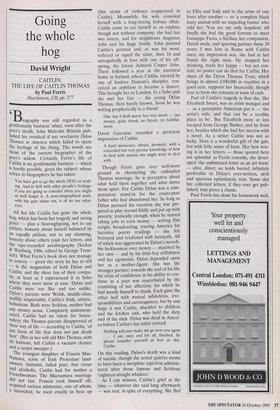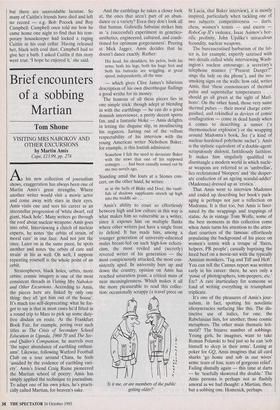Going the whole hog
David Wright
CAITLIN: THE LIFE OF CAITLIN THOMAS by Paul Ferris Hutchinson, £20, pp. 277 Biography was still regarded as a gentlemanly business' when, soon after the poet's death, John Malcolm Brinnin pub- lished his veridical if too revelatory Dylan Thomas in America which failed to spare the feelings of the living. The words are those of the current biographer of the poet's widow. Certainly Ferris's life of Caitlin is no gentlemanly business — which is hardly possible, given the subject, whose advice to biographers he has taken:
You have got to go the whole HOG or noth- ing. And to hell with other people's feelings: if you are going to consider them you might as well forget it. A semi-biographical work, with the guts taken out, is of no use what- ever.
All her life Caitlin has gone the whole hog, which has been her tragedy and saving grace — plus a thoroughgoing, not to say pitiless, honesty about herself balanced by an equally pitiless, not to say alarming, honesty about others (vide her letters, and the tape-recorded autobiography (Seeker & Warburg, 1986, edited by George Trem- lett). What Ferris's book does not manage to convey — given the story he has to tell — is the magnetism of both Dylan and Caitlin, and the sheer fun of their compa- ny, at least as I experienced it in Soho where they were most at ease. Dylan and Caitlin were too like and too unlike. Dylan's parents were Welsh, middle-class, stuffily respectable; Caitlin's Irish, artistic, bohemian. Both were feckless, neither had any money sense. Completely undomesti- cated, Caitlin had no talent for house- wifery; the Thomas parents disapproved of their way of life — according to Caitlin, 'of any form of life that does not put death first'. (But in her will old Mrs Thomas, with sly humour, left Caitlin a vacuum cleaner and a carpet sweeper.) The youngest daughter of Francis Mac- Namara, scion of Irish Protestant land- owners, fantasist, failed poet, bon viveur and alcoholic, Caitlin had for mother a Frenchwoman. The Macnamara marriage did not last. Francis took himself off, acquired various mistresses, one of whom, a masochist, he used cruelly to beat up
(this strain of violence reappeared in Caitlin). Meanwhile his wife consoled herself with a long-lasting lesbian affair. Caitlin came to see herself as an orphan, though not without company; she had her two sisters, and for neighbours Augustus John and his huge family. John painted Caitlin's portrait and, as was his wont, seduced or raped the sitter, then 16 and unrequitedly in love with one of his off- spring, the future Admiral Caspar John. There followed a year at the ancestral home in Ireland, where Caitlin, tutored by one of Isadora Duncan's disciples, con- ceived an ambition to become a dancer. This brought her to London. In a Soho pub she met her fate — the young Dylan Thomas, then barely known. Soon he was writing prophetically to a friend:
One day I shall marry her very much — (no money, quite drunk, no future, no faithful- ness).
David Gascoyne recorded a prescient impression of Caitlin:
A hard innocence, obtuse, hermetic, with a concealed but very precise knowledge of how to deal with anyone she might want to deal with.
Though Ferris goes over well-worn ground in chronicling the embattled Thomas marriage, he is perceptive about what held them together and what drove them apart. For Caitlin Dylan was a com- pensatory stand-in for the ersatz-poet father who had abandoned her. So long as Dylan pursued his vocation she was pre- pared to play second fiddle and put up with poverty: ironically enough, when he started taking jobs to earn money — writing film scripts, broadcasting, touring America for lucrative poetry readings — she felt betrayed and retaliated with betrayals. All of which was aggravated by Dylan's incredi- ble fecklessness over money — matched by her own — and by his little-boy selfishness and her egomania. Dylan depended upon her as a mother-figure. She was the stronger partner; towards the end of his life his crisis of confidence in his ability to con- tinue as a poet was exacerbated by the crumbling of her affection: for which he had mostly himself to thank. Each gave the other hell with mutual infidelities, irre- sponsibilities and extravagances; but by and large it was Caitlin, shackled to children and the kitchen sink, who held the dirty end of the stick. Dylan was dead in Ameri- ca before Caitlin's last letter arrived:
Nothing will ever make me go near you again . . I am, once and for all, finished. So please consider yourself as free as shit. Caitlin.
On this reading, Dylan's death was a kind of suicide, though the actual quietus seems to have been a morphine injection adminis- tered after those famous and fictitious `eighteen straight whiskies'.
As I can witness, Caitlin's grief at the time — whatever she said long afterwards — was real, in spite of everything. She fled to Elba and Italy and to the arms of one lover after another — to 'a complete black hairy animal with no impeding brains' who told her 'You are my only hopeless' till finally she had the good fortune to meet Guiseppe Fazio, a Sicilian, her companion, Dutch uncle, and sparring partner these 30 years. I met him in Rome with Caitlin once; my impression was, she had at last found the right man. He stopped her drinking, made her happy — but not con- tent; no power can do that for Caitlin. Her share of the Dylan Thomas Trust, which brings in almost £100,000 in royalties in a good year, supports her financially; though true to form she remains in want of cash.
Part of Caitlin's tragedy is that she, like Elizabeth Smart, was an artist manqué and — as a perceptive American put it — 'the artist's wife, and that can be a terrible place to be'. But Elizabeth more or less escaped from George Barker, and he from her; besides which she had her success with a novel. As a writer Caitlin was not so lucky. Hers is a wonderful gift of the gab, but with little sense of form. Her best writ- ing is in her letters — those quoted here are splendid: as Ferris remarks, she devel- oped 'the embittered letter as an art form' — alive, direct, no holds barred, infinitely preferable to Dylan's over-written, arch and specious epistolatory vein. Some day her collected letters, if they ever get pub- lished, may prove a classic.
Paul Ferris has done his homework well, but there are unavoidable lacunae. So many of Caitlin's friends have died and left no record — e.g. Bob Pocock and Roy Campbell. Campbell once told me how he came home one night to find that his tem- porary housekeeper had locked a raging Caitlin in his coal cellar. Having released her, black with coal dust, Campbell had to give her a bath. I asked Caitlin if this story were true. 'I hope he enjoyed it,' she said.



























































 Previous page
Previous page